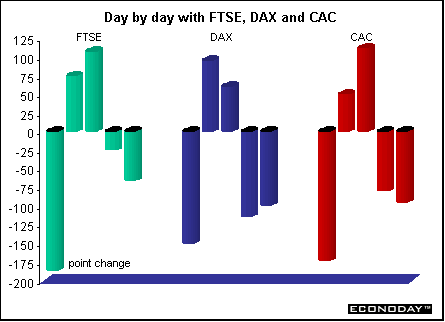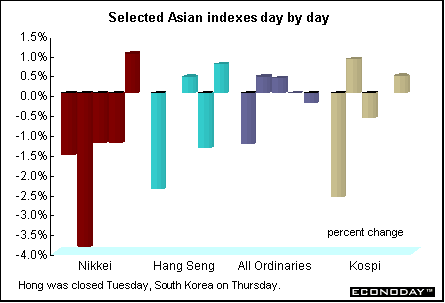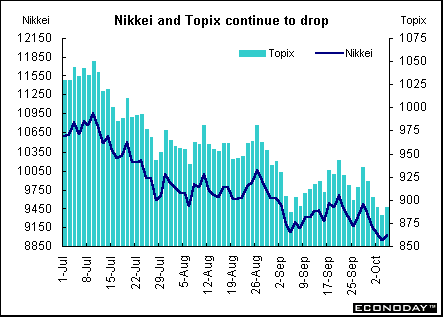 |

Europe and Britain
Trading was volatile last week. The third quarter ended on Monday with sizable drops in the FTSE, CAC and DAX. All three had a miserable third quarter, but the DAX took it on the chin the hardest. Investors worried about the strength of the banking system and sold banking stocks. While economic data for Britain, especially the purchasing managers surveys, showed the economy more vibrant than those in Europe, Germany's data showed that things there were getting worse, not better. And with the thin margin of victory in the national elections two weeks ago, Chancellor Helmut Schroeder will have a difficult time getting any of the much needed reforms agreed upon.

Asia
Most exporters lost ground in Asian trading last week, thanks to the West coast port strike. But while all Asian indexes followed here were down on the week, the focus has been on Japan, where the Nikkei closed below 9,000 Thursday for the first time in almost 20 years. Investors are worried that the government may harden its stance on bad-loan problems that are dogging the banks and the economy. This is not without irony. But while investors are sick of the trillions in bad debts crippling the banking system and want reform, they are also scared that the pain caused by any cure could be unbearable. The result was a mass sell-off of banking stocks on Thursday, driving the benchmark Nikkei down below the key 9,000 level. Bank shares have plunged on the increased likelihood that the government will directly inject public funds into banks in order to reduce their non-performing loans. Such a move could dilute existing shares, say analysts, and could lead to a de-facto nationalization of banks. Analysts also caution that the stocks are risky because both bank executives and shareholders face pressure regarding their responsibility for the problems.

Japanese Prime Minister Junichiro Koizumi replaced his top banking regulator, removing an opponent of the use of public money to bail out banks saddled with $430 billion of bad loans. The yen rallied and initially bank stocks were higher on expectations Koizumi's first cabinet reshuffle since taking office in April 2001 will help him push through measures to end Japan's third recession in a decade. Bank shares fell after officials were unable to give details of how the package would succeed when two previous bank bailouts have failed. Pressure to deal with bad loans has mounted since Bank of Japan Governor Masaru Hayami announced that the bank would buy some of the $200 billion of shares held by lenders. Banks may have to subtract losses on their stock holdings from their capital when they close their books on the fiscal first half, which ended Monday. That has sparked concern that some banks, after the Nikkei 225 Stock Average fell to a 19-year low in September, may not have enough capital to meet international requirements.

Japanese capital flows in the week ending September 27th showed Japanese investors were again net buyers of foreign bonds and foreign equities. Foreign investors were again heavy net sellers of Japanese equities and net sellers of Japanese bonds, data released by the Ministry of Finance Thursday showed.


Last Week's Highlights • Global Stock Market Indexes • Recap of Global Markets • Currencies • Indicator Scoreboard

The Bottom Line • Looking Ahead
|
 |